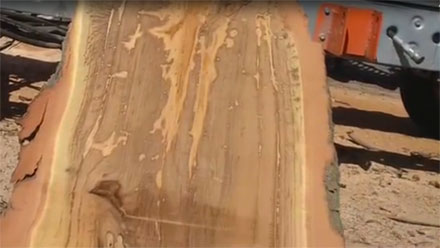
Sidney Gendron runs Sawmill Sid, a family-run sawmill that collects felled and diseased trees at its Tree and Wood Recovery Centre in Mississaug, Canada. Source: CBC Canada
Once processed, downed trees can be repurposed as furniture, art pieces or materials for housing and construction.
Sawmill Sid is part of a nascent wood recycling industry that aims to combat climate change by diverting landfill waste and reducing the carbon footprint of the forestry industry.
“When trees come down because of storm or disease we try and play our part in making sure as much is used as possible,” said Mr Gendron, who runs the sawmill in partnership with his wife, Sheila, and daughter, Sacha.
“We make sure that we get the highest and best value out of that wood,” he said.
Mr Gendron said his sawmill has already received 15 to 20 dump-truck loads of wood from a recent windstorm.
“Our yard is pretty full right now,” he said.
Mr Gendron buys logs and trees from city woodlots or takes donations from private companies looking to get rid of used wood. They sort it, cut it and the resell the lumber to suppliers who make it into finished products.
The company’s customers include developers, renovators and restaurateurs who want to buy local, but also artisans and craftspeople who turn the wood into art and other products.
Richard Posa is an artist and builder who recently became a customer of the Gendrons. He uses salvaged wood to make art, sculptures and furniture.
“Out of every tree, every chunk of wood, something can be made from it,” said Mr Posa.
Mr Posa says the variety of wood he has access to has increased since meeting the Gendrons.
“The wood resource is practically endless now,” he said. “Especially with the storm that came down the other day.”
Mr Gendron says much of the “wood waste” generated each year is turned into wood chips and sent to landfills, where it releases carbon dioxide into the atmosphere.
A city spokesperson says Toronto paid some Can$450,000 last year to companies who chip wood in tub grinders — large machines that convert logs and trees into wood chips — while charging companies like Sawmill Sid to get access to the wood. However, all chipped wood from city-owned trees is reused in the Toronto’s tree planting programs.
Mr Gendron would like it to be easier for companies like his to access used wood.
“We are taking wood that would normally be chipped and putting it into the hands of woodworkers across Ontario and allowing them to be sustainable themselves,” said Mr Gendron.
“We’re building sustainable neighbourhoods and businesses within the GTA.”
On top of diverting landfill waste, reusing trees and logs keeps the carbon inside the wood, said Gendron. The company claims it captured over 6800 tonnes of carbon emissions in 2016 by making re-used wood products.
Sacha Gendron, Sidney’s daughter, believes this number will rise in the coming years.
“As climate change progresses we’re going to see more storms, more damage and more wood waste,” she said.
“We need to get the public to understand that there are alternatives to common practices that are taking place such as chipping.”
Jim Donaldson, the CEO of the Alberta-based Canadian Wood Waste Recycling Business Group, says it will take a big shift in government thinking for the wood recycling industry to take off.
His group is bringing together industry and academia to shepherd the development of a wood recycling industry across Canada.
“The biggest problem is lack of education at a governmental level,” said Donaldson.
“The City of Toronto has a pretty good wood reuse program but where they’re missing is reusing used wood.”
Donaldson says a lot of wood that is burned or chipped and sent to landfill can easily be repurposed.
One of the main problems, he says, is the lack of reliable data. His business group is conducting 35 feasibility studies to fill in this knowledge gap.
For the Gendrons, it’s only a matter of time before people catch on to the value of recycling wood.
“Recycling was tough to get started but now everyone does it without even thinking,” said Sidney Gendron.
“We need to start thinking about what’s the right thing to do here, and keep on doing it.”





